Business Law: Legal Framework Analysis for Business Solutions
VerifiedAdded on 2020/12/10
|18
|5912
|71
Report
AI Summary
This report provides a comprehensive overview of business law, examining the sources of English law, including acts of parliament, common law, customs, legislation, and European Union law. It explores the laws organizations must comply with, such as employment, consumer, company, competition, health and safety, fire safety, and labor laws. The report delves into the role of government in law-making, from agenda presentation to parliamentary stages and the application of common, statutory, and European law in justice courts. Furthermore, it analyzes the impact of company, employment, and contract law on businesses, using a case study to illustrate the legal considerations in establishing a company and selecting a brand name. Finally, the report suggests legal solutions for different business problems, justifying the use of these solutions and recommending legal solutions based on different legal frameworks.
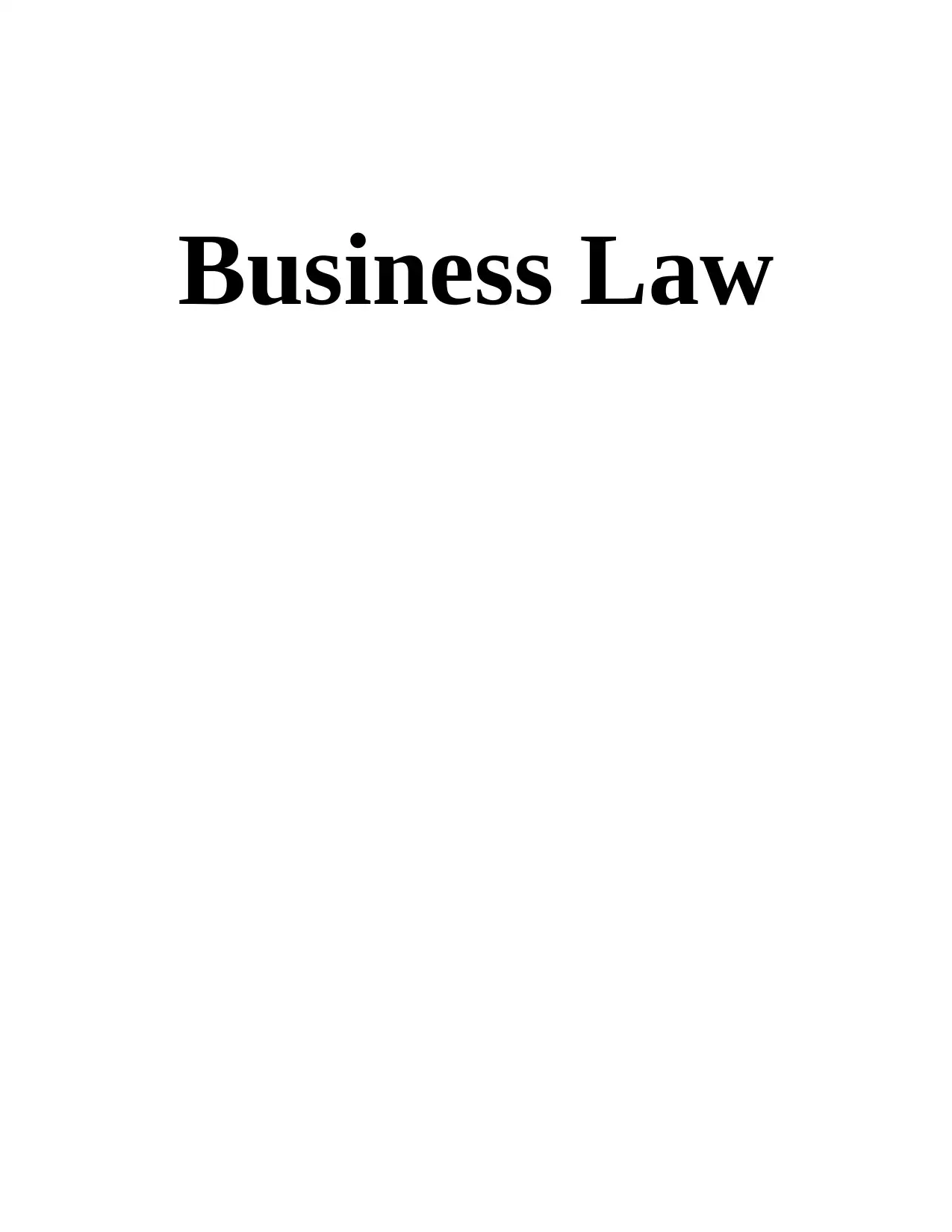
Business Law
Paraphrase This Document
Need a fresh take? Get an instant paraphrase of this document with our AI Paraphraser
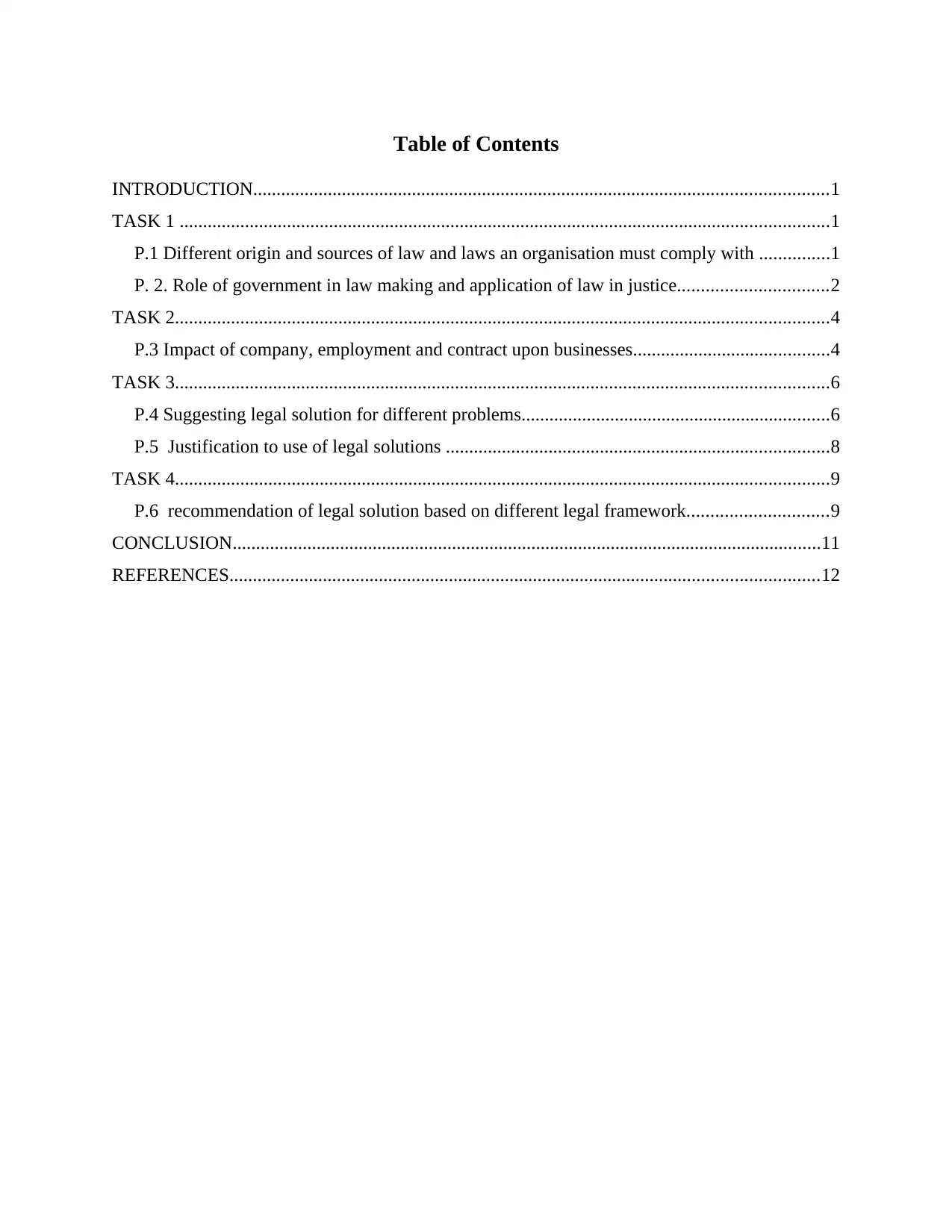
Table of Contents
INTRODUCTION...........................................................................................................................1
TASK 1 ...........................................................................................................................................1
P.1 Different origin and sources of law and laws an organisation must comply with ...............1
P. 2. Role of government in law making and application of law in justice................................2
TASK 2............................................................................................................................................4
P.3 Impact of company, employment and contract upon businesses..........................................4
TASK 3............................................................................................................................................6
P.4 Suggesting legal solution for different problems..................................................................6
P.5 Justification to use of legal solutions ..................................................................................8
TASK 4............................................................................................................................................9
P.6 recommendation of legal solution based on different legal framework..............................9
CONCLUSION..............................................................................................................................11
REFERENCES..............................................................................................................................12
INTRODUCTION...........................................................................................................................1
TASK 1 ...........................................................................................................................................1
P.1 Different origin and sources of law and laws an organisation must comply with ...............1
P. 2. Role of government in law making and application of law in justice................................2
TASK 2............................................................................................................................................4
P.3 Impact of company, employment and contract upon businesses..........................................4
TASK 3............................................................................................................................................6
P.4 Suggesting legal solution for different problems..................................................................6
P.5 Justification to use of legal solutions ..................................................................................8
TASK 4............................................................................................................................................9
P.6 recommendation of legal solution based on different legal framework..............................9
CONCLUSION..............................................................................................................................11
REFERENCES..............................................................................................................................12
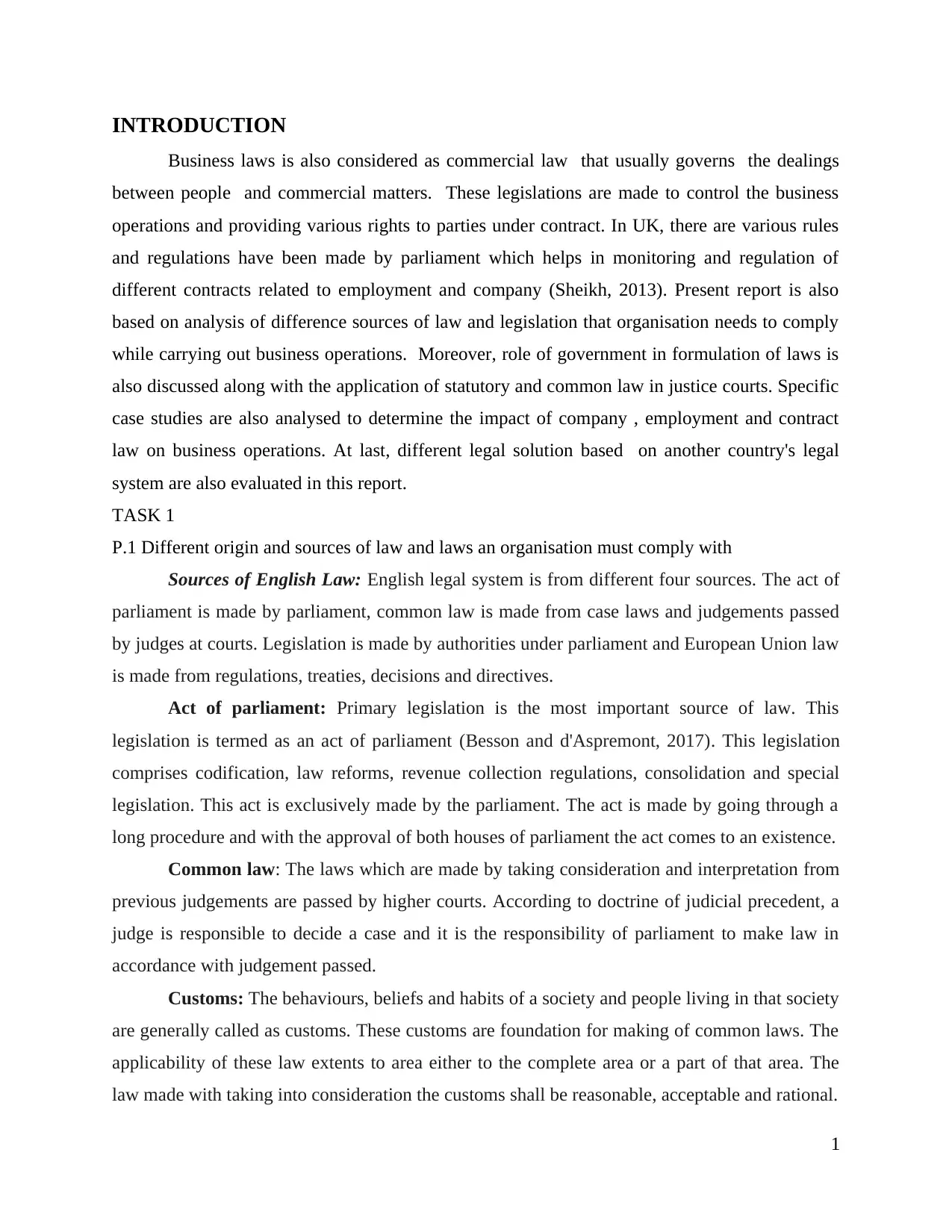
INTRODUCTION
Business laws is also considered as commercial law that usually governs the dealings
between people and commercial matters. These legislations are made to control the business
operations and providing various rights to parties under contract. In UK, there are various rules
and regulations have been made by parliament which helps in monitoring and regulation of
different contracts related to employment and company (Sheikh, 2013). Present report is also
based on analysis of difference sources of law and legislation that organisation needs to comply
while carrying out business operations. Moreover, role of government in formulation of laws is
also discussed along with the application of statutory and common law in justice courts. Specific
case studies are also analysed to determine the impact of company , employment and contract
law on business operations. At last, different legal solution based on another country's legal
system are also evaluated in this report.
TASK 1
P.1 Different origin and sources of law and laws an organisation must comply with
Sources of English Law: English legal system is from different four sources. The act of
parliament is made by parliament, common law is made from case laws and judgements passed
by judges at courts. Legislation is made by authorities under parliament and European Union law
is made from regulations, treaties, decisions and directives.
Act of parliament: Primary legislation is the most important source of law. This
legislation is termed as an act of parliament (Besson and d'Aspremont, 2017). This legislation
comprises codification, law reforms, revenue collection regulations, consolidation and special
legislation. This act is exclusively made by the parliament. The act is made by going through a
long procedure and with the approval of both houses of parliament the act comes to an existence.
Common law: The laws which are made by taking consideration and interpretation from
previous judgements are passed by higher courts. According to doctrine of judicial precedent, a
judge is responsible to decide a case and it is the responsibility of parliament to make law in
accordance with judgement passed.
Customs: The behaviours, beliefs and habits of a society and people living in that society
are generally called as customs. These customs are foundation for making of common laws. The
applicability of these law extents to area either to the complete area or a part of that area. The
law made with taking into consideration the customs shall be reasonable, acceptable and rational.
1
Business laws is also considered as commercial law that usually governs the dealings
between people and commercial matters. These legislations are made to control the business
operations and providing various rights to parties under contract. In UK, there are various rules
and regulations have been made by parliament which helps in monitoring and regulation of
different contracts related to employment and company (Sheikh, 2013). Present report is also
based on analysis of difference sources of law and legislation that organisation needs to comply
while carrying out business operations. Moreover, role of government in formulation of laws is
also discussed along with the application of statutory and common law in justice courts. Specific
case studies are also analysed to determine the impact of company , employment and contract
law on business operations. At last, different legal solution based on another country's legal
system are also evaluated in this report.
TASK 1
P.1 Different origin and sources of law and laws an organisation must comply with
Sources of English Law: English legal system is from different four sources. The act of
parliament is made by parliament, common law is made from case laws and judgements passed
by judges at courts. Legislation is made by authorities under parliament and European Union law
is made from regulations, treaties, decisions and directives.
Act of parliament: Primary legislation is the most important source of law. This
legislation is termed as an act of parliament (Besson and d'Aspremont, 2017). This legislation
comprises codification, law reforms, revenue collection regulations, consolidation and special
legislation. This act is exclusively made by the parliament. The act is made by going through a
long procedure and with the approval of both houses of parliament the act comes to an existence.
Common law: The laws which are made by taking consideration and interpretation from
previous judgements are passed by higher courts. According to doctrine of judicial precedent, a
judge is responsible to decide a case and it is the responsibility of parliament to make law in
accordance with judgement passed.
Customs: The behaviours, beliefs and habits of a society and people living in that society
are generally called as customs. These customs are foundation for making of common laws. The
applicability of these law extents to area either to the complete area or a part of that area. The
law made with taking into consideration the customs shall be reasonable, acceptable and rational.
1
⊘ This is a preview!⊘
Do you want full access?
Subscribe today to unlock all pages.

Trusted by 1+ million students worldwide
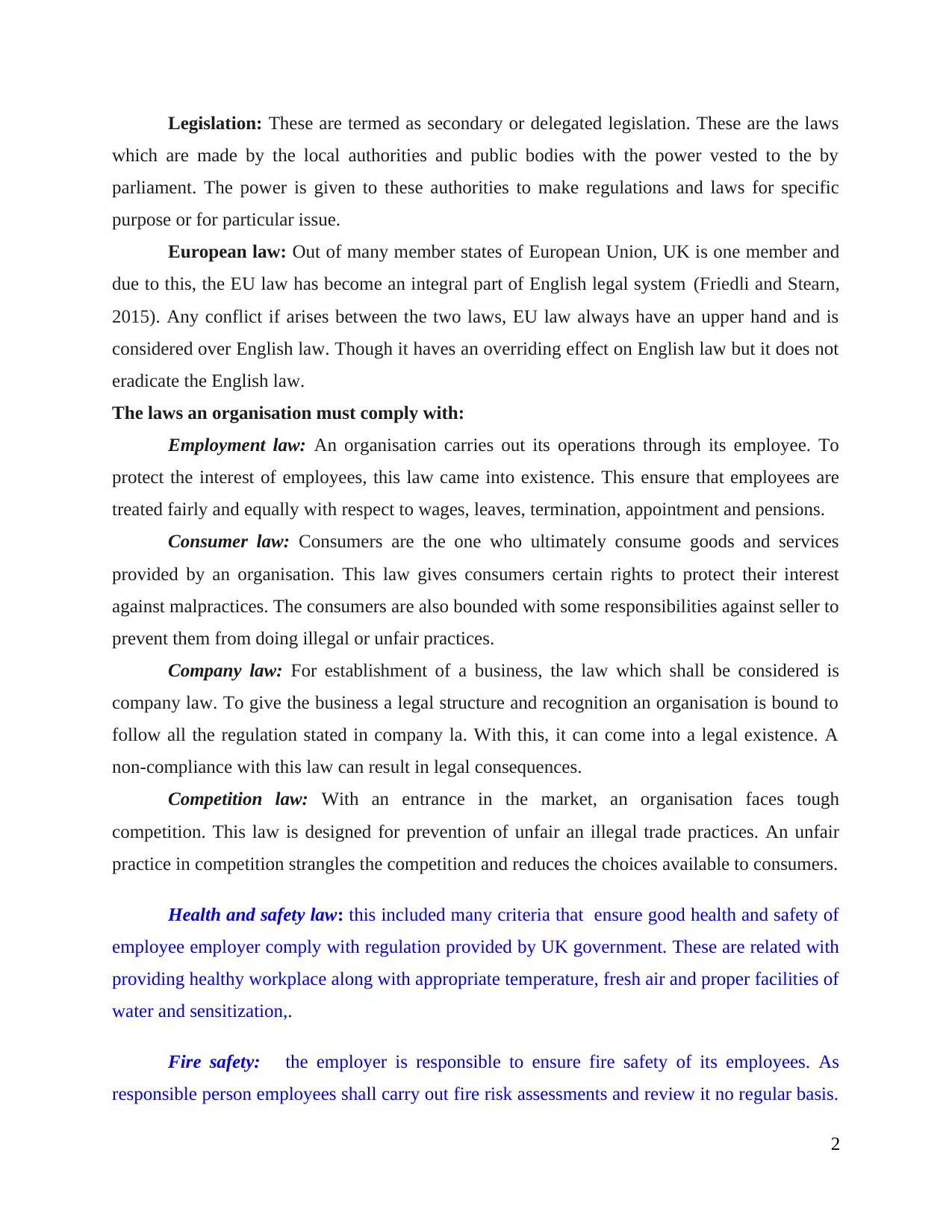
Legislation: These are termed as secondary or delegated legislation. These are the laws
which are made by the local authorities and public bodies with the power vested to the by
parliament. The power is given to these authorities to make regulations and laws for specific
purpose or for particular issue.
European law: Out of many member states of European Union, UK is one member and
due to this, the EU law has become an integral part of English legal system (Friedli and Stearn,
2015). Any conflict if arises between the two laws, EU law always have an upper hand and is
considered over English law. Though it haves an overriding effect on English law but it does not
eradicate the English law.
The laws an organisation must comply with:
Employment law: An organisation carries out its operations through its employee. To
protect the interest of employees, this law came into existence. This ensure that employees are
treated fairly and equally with respect to wages, leaves, termination, appointment and pensions.
Consumer law: Consumers are the one who ultimately consume goods and services
provided by an organisation. This law gives consumers certain rights to protect their interest
against malpractices. The consumers are also bounded with some responsibilities against seller to
prevent them from doing illegal or unfair practices.
Company law: For establishment of a business, the law which shall be considered is
company law. To give the business a legal structure and recognition an organisation is bound to
follow all the regulation stated in company la. With this, it can come into a legal existence. A
non-compliance with this law can result in legal consequences.
Competition law: With an entrance in the market, an organisation faces tough
competition. This law is designed for prevention of unfair an illegal trade practices. An unfair
practice in competition strangles the competition and reduces the choices available to consumers.
Health and safety law: this included many criteria that ensure good health and safety of
employee employer comply with regulation provided by UK government. These are related with
providing healthy workplace along with appropriate temperature, fresh air and proper facilities of
water and sensitization,.
Fire safety: the employer is responsible to ensure fire safety of its employees. As
responsible person employees shall carry out fire risk assessments and review it no regular basis.
2
which are made by the local authorities and public bodies with the power vested to the by
parliament. The power is given to these authorities to make regulations and laws for specific
purpose or for particular issue.
European law: Out of many member states of European Union, UK is one member and
due to this, the EU law has become an integral part of English legal system (Friedli and Stearn,
2015). Any conflict if arises between the two laws, EU law always have an upper hand and is
considered over English law. Though it haves an overriding effect on English law but it does not
eradicate the English law.
The laws an organisation must comply with:
Employment law: An organisation carries out its operations through its employee. To
protect the interest of employees, this law came into existence. This ensure that employees are
treated fairly and equally with respect to wages, leaves, termination, appointment and pensions.
Consumer law: Consumers are the one who ultimately consume goods and services
provided by an organisation. This law gives consumers certain rights to protect their interest
against malpractices. The consumers are also bounded with some responsibilities against seller to
prevent them from doing illegal or unfair practices.
Company law: For establishment of a business, the law which shall be considered is
company law. To give the business a legal structure and recognition an organisation is bound to
follow all the regulation stated in company la. With this, it can come into a legal existence. A
non-compliance with this law can result in legal consequences.
Competition law: With an entrance in the market, an organisation faces tough
competition. This law is designed for prevention of unfair an illegal trade practices. An unfair
practice in competition strangles the competition and reduces the choices available to consumers.
Health and safety law: this included many criteria that ensure good health and safety of
employee employer comply with regulation provided by UK government. These are related with
providing healthy workplace along with appropriate temperature, fresh air and proper facilities of
water and sensitization,.
Fire safety: the employer is responsible to ensure fire safety of its employees. As
responsible person employees shall carry out fire risk assessments and review it no regular basis.
2
Paraphrase This Document
Need a fresh take? Get an instant paraphrase of this document with our AI Paraphraser
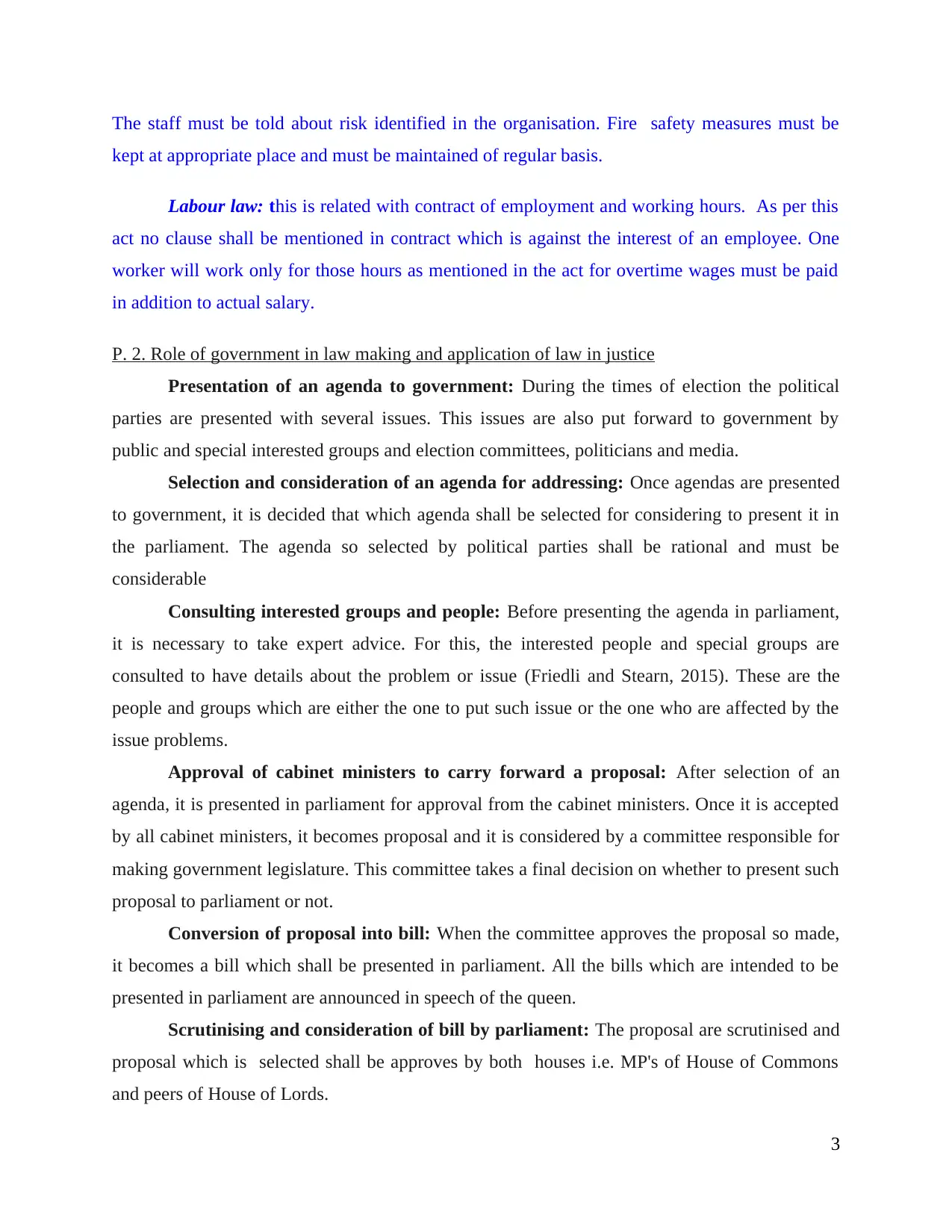
The staff must be told about risk identified in the organisation. Fire safety measures must be
kept at appropriate place and must be maintained of regular basis.
Labour law: this is related with contract of employment and working hours. As per this
act no clause shall be mentioned in contract which is against the interest of an employee. One
worker will work only for those hours as mentioned in the act for overtime wages must be paid
in addition to actual salary.
P. 2. Role of government in law making and application of law in justice
Presentation of an agenda to government: During the times of election the political
parties are presented with several issues. This issues are also put forward to government by
public and special interested groups and election committees, politicians and media.
Selection and consideration of an agenda for addressing: Once agendas are presented
to government, it is decided that which agenda shall be selected for considering to present it in
the parliament. The agenda so selected by political parties shall be rational and must be
considerable
Consulting interested groups and people: Before presenting the agenda in parliament,
it is necessary to take expert advice. For this, the interested people and special groups are
consulted to have details about the problem or issue (Friedli and Stearn, 2015). These are the
people and groups which are either the one to put such issue or the one who are affected by the
issue problems.
Approval of cabinet ministers to carry forward a proposal: After selection of an
agenda, it is presented in parliament for approval from the cabinet ministers. Once it is accepted
by all cabinet ministers, it becomes proposal and it is considered by a committee responsible for
making government legislature. This committee takes a final decision on whether to present such
proposal to parliament or not.
Conversion of proposal into bill: When the committee approves the proposal so made,
it becomes a bill which shall be presented in parliament. All the bills which are intended to be
presented in parliament are announced in speech of the queen.
Scrutinising and consideration of bill by parliament: The proposal are scrutinised and
proposal which is selected shall be approves by both houses i.e. MP's of House of Commons
and peers of House of Lords.
3
kept at appropriate place and must be maintained of regular basis.
Labour law: this is related with contract of employment and working hours. As per this
act no clause shall be mentioned in contract which is against the interest of an employee. One
worker will work only for those hours as mentioned in the act for overtime wages must be paid
in addition to actual salary.
P. 2. Role of government in law making and application of law in justice
Presentation of an agenda to government: During the times of election the political
parties are presented with several issues. This issues are also put forward to government by
public and special interested groups and election committees, politicians and media.
Selection and consideration of an agenda for addressing: Once agendas are presented
to government, it is decided that which agenda shall be selected for considering to present it in
the parliament. The agenda so selected by political parties shall be rational and must be
considerable
Consulting interested groups and people: Before presenting the agenda in parliament,
it is necessary to take expert advice. For this, the interested people and special groups are
consulted to have details about the problem or issue (Friedli and Stearn, 2015). These are the
people and groups which are either the one to put such issue or the one who are affected by the
issue problems.
Approval of cabinet ministers to carry forward a proposal: After selection of an
agenda, it is presented in parliament for approval from the cabinet ministers. Once it is accepted
by all cabinet ministers, it becomes proposal and it is considered by a committee responsible for
making government legislature. This committee takes a final decision on whether to present such
proposal to parliament or not.
Conversion of proposal into bill: When the committee approves the proposal so made,
it becomes a bill which shall be presented in parliament. All the bills which are intended to be
presented in parliament are announced in speech of the queen.
Scrutinising and consideration of bill by parliament: The proposal are scrutinised and
proposal which is selected shall be approves by both houses i.e. MP's of House of Commons
and peers of House of Lords.
3
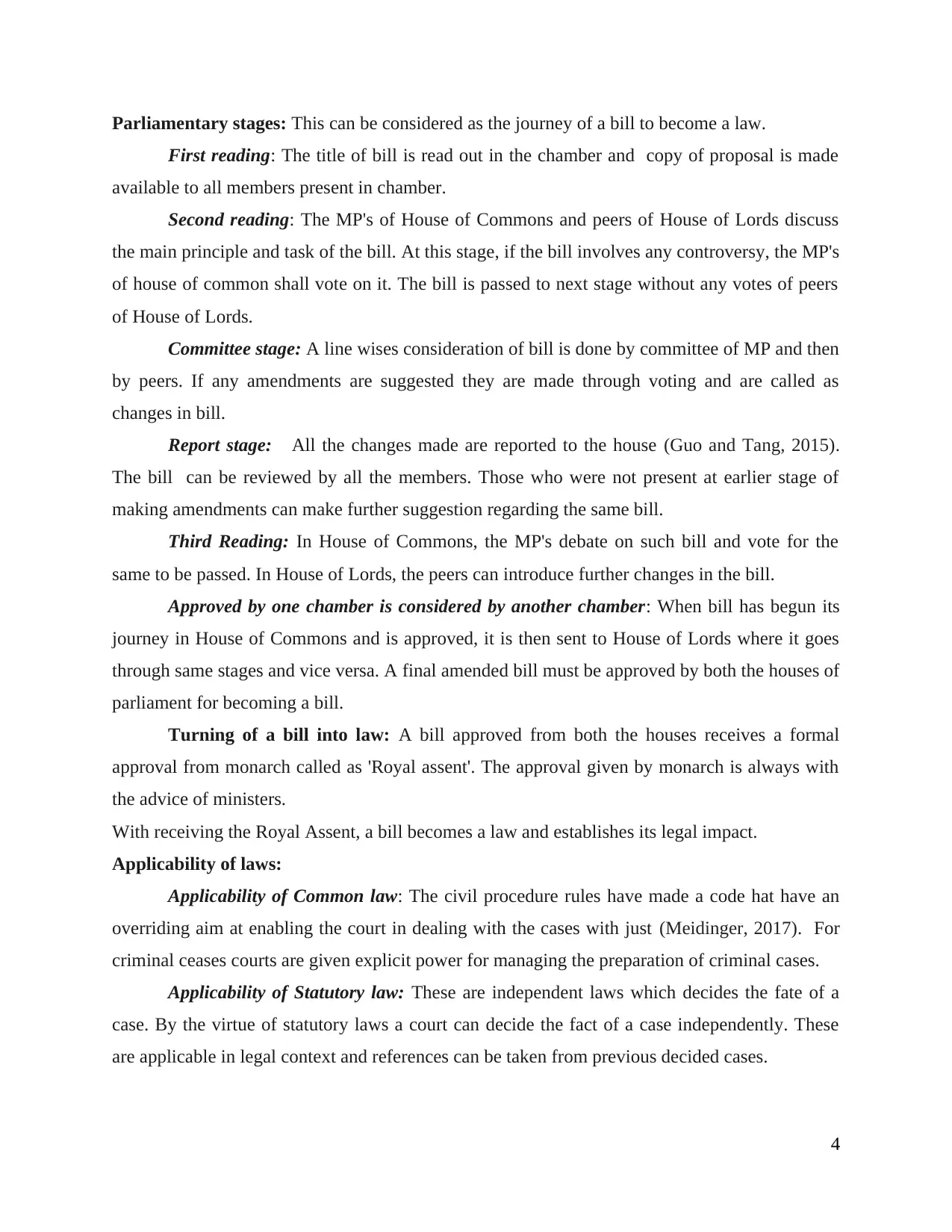
Parliamentary stages: This can be considered as the journey of a bill to become a law.
First reading: The title of bill is read out in the chamber and copy of proposal is made
available to all members present in chamber.
Second reading: The MP's of House of Commons and peers of House of Lords discuss
the main principle and task of the bill. At this stage, if the bill involves any controversy, the MP's
of house of common shall vote on it. The bill is passed to next stage without any votes of peers
of House of Lords.
Committee stage: A line wises consideration of bill is done by committee of MP and then
by peers. If any amendments are suggested they are made through voting and are called as
changes in bill.
Report stage: All the changes made are reported to the house (Guo and Tang, 2015).
The bill can be reviewed by all the members. Those who were not present at earlier stage of
making amendments can make further suggestion regarding the same bill.
Third Reading: In House of Commons, the MP's debate on such bill and vote for the
same to be passed. In House of Lords, the peers can introduce further changes in the bill.
Approved by one chamber is considered by another chamber: When bill has begun its
journey in House of Commons and is approved, it is then sent to House of Lords where it goes
through same stages and vice versa. A final amended bill must be approved by both the houses of
parliament for becoming a bill.
Turning of a bill into law: A bill approved from both the houses receives a formal
approval from monarch called as 'Royal assent'. The approval given by monarch is always with
the advice of ministers.
With receiving the Royal Assent, a bill becomes a law and establishes its legal impact.
Applicability of laws:
Applicability of Common law: The civil procedure rules have made a code hat have an
overriding aim at enabling the court in dealing with the cases with just (Meidinger, 2017). For
criminal ceases courts are given explicit power for managing the preparation of criminal cases.
Applicability of Statutory law: These are independent laws which decides the fate of a
case. By the virtue of statutory laws a court can decide the fact of a case independently. These
are applicable in legal context and references can be taken from previous decided cases.
4
First reading: The title of bill is read out in the chamber and copy of proposal is made
available to all members present in chamber.
Second reading: The MP's of House of Commons and peers of House of Lords discuss
the main principle and task of the bill. At this stage, if the bill involves any controversy, the MP's
of house of common shall vote on it. The bill is passed to next stage without any votes of peers
of House of Lords.
Committee stage: A line wises consideration of bill is done by committee of MP and then
by peers. If any amendments are suggested they are made through voting and are called as
changes in bill.
Report stage: All the changes made are reported to the house (Guo and Tang, 2015).
The bill can be reviewed by all the members. Those who were not present at earlier stage of
making amendments can make further suggestion regarding the same bill.
Third Reading: In House of Commons, the MP's debate on such bill and vote for the
same to be passed. In House of Lords, the peers can introduce further changes in the bill.
Approved by one chamber is considered by another chamber: When bill has begun its
journey in House of Commons and is approved, it is then sent to House of Lords where it goes
through same stages and vice versa. A final amended bill must be approved by both the houses of
parliament for becoming a bill.
Turning of a bill into law: A bill approved from both the houses receives a formal
approval from monarch called as 'Royal assent'. The approval given by monarch is always with
the advice of ministers.
With receiving the Royal Assent, a bill becomes a law and establishes its legal impact.
Applicability of laws:
Applicability of Common law: The civil procedure rules have made a code hat have an
overriding aim at enabling the court in dealing with the cases with just (Meidinger, 2017). For
criminal ceases courts are given explicit power for managing the preparation of criminal cases.
Applicability of Statutory law: These are independent laws which decides the fate of a
case. By the virtue of statutory laws a court can decide the fact of a case independently. These
are applicable in legal context and references can be taken from previous decided cases.
4
⊘ This is a preview!⊘
Do you want full access?
Subscribe today to unlock all pages.

Trusted by 1+ million students worldwide
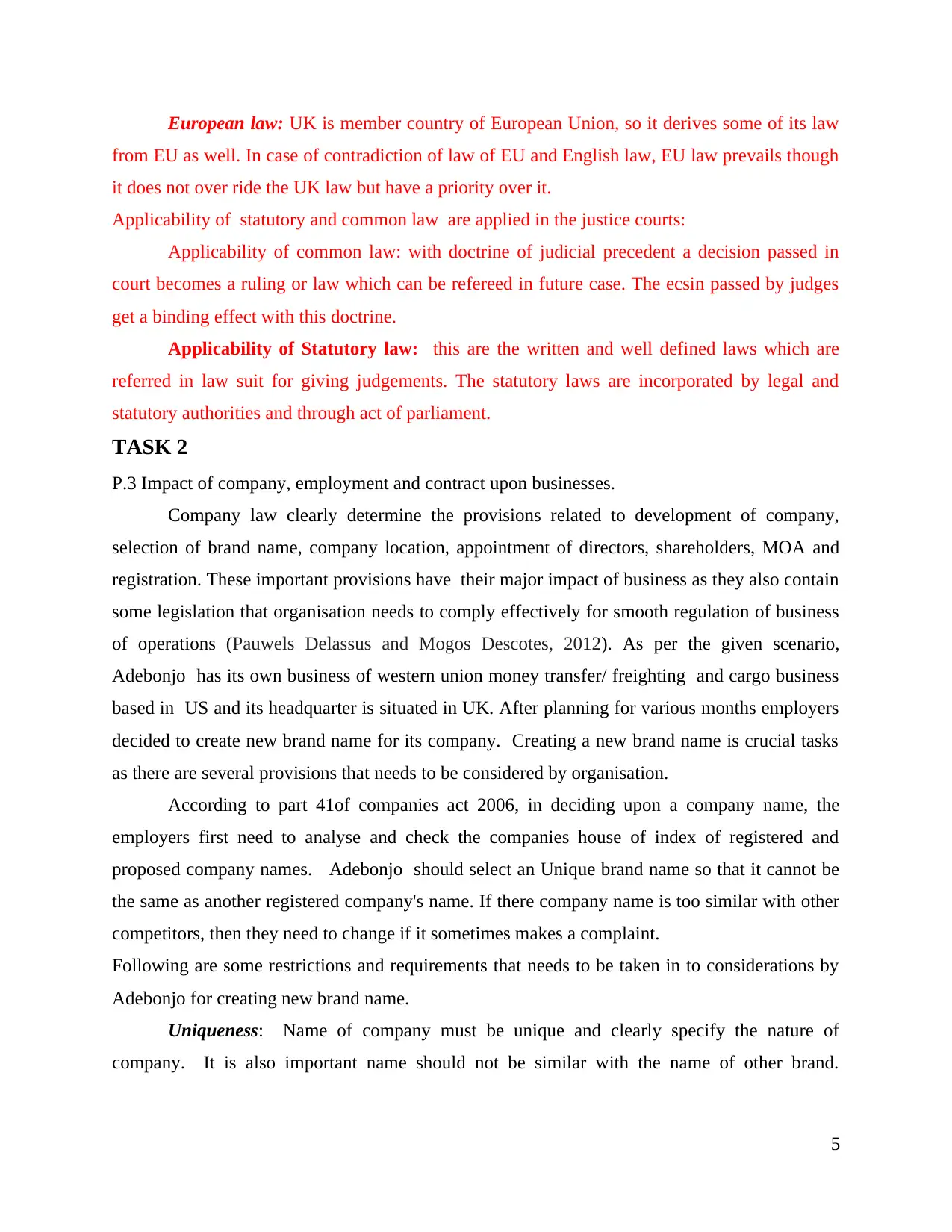
European law: UK is member country of European Union, so it derives some of its law
from EU as well. In case of contradiction of law of EU and English law, EU law prevails though
it does not over ride the UK law but have a priority over it.
Applicability of statutory and common law are applied in the justice courts:
Applicability of common law: with doctrine of judicial precedent a decision passed in
court becomes a ruling or law which can be refereed in future case. The ecsin passed by judges
get a binding effect with this doctrine.
Applicability of Statutory law: this are the written and well defined laws which are
referred in law suit for giving judgements. The statutory laws are incorporated by legal and
statutory authorities and through act of parliament.
TASK 2
P.3 Impact of company, employment and contract upon businesses.
Company law clearly determine the provisions related to development of company,
selection of brand name, company location, appointment of directors, shareholders, MOA and
registration. These important provisions have their major impact of business as they also contain
some legislation that organisation needs to comply effectively for smooth regulation of business
of operations (Pauwels Delassus and Mogos Descotes, 2012). As per the given scenario,
Adebonjo has its own business of western union money transfer/ freighting and cargo business
based in US and its headquarter is situated in UK. After planning for various months employers
decided to create new brand name for its company. Creating a new brand name is crucial tasks
as there are several provisions that needs to be considered by organisation.
According to part 41of companies act 2006, in deciding upon a company name, the
employers first need to analyse and check the companies house of index of registered and
proposed company names. Adebonjo should select an Unique brand name so that it cannot be
the same as another registered company's name. If there company name is too similar with other
competitors, then they need to change if it sometimes makes a complaint.
Following are some restrictions and requirements that needs to be taken in to considerations by
Adebonjo for creating new brand name.
Uniqueness: Name of company must be unique and clearly specify the nature of
company. It is also important name should not be similar with the name of other brand.
5
from EU as well. In case of contradiction of law of EU and English law, EU law prevails though
it does not over ride the UK law but have a priority over it.
Applicability of statutory and common law are applied in the justice courts:
Applicability of common law: with doctrine of judicial precedent a decision passed in
court becomes a ruling or law which can be refereed in future case. The ecsin passed by judges
get a binding effect with this doctrine.
Applicability of Statutory law: this are the written and well defined laws which are
referred in law suit for giving judgements. The statutory laws are incorporated by legal and
statutory authorities and through act of parliament.
TASK 2
P.3 Impact of company, employment and contract upon businesses.
Company law clearly determine the provisions related to development of company,
selection of brand name, company location, appointment of directors, shareholders, MOA and
registration. These important provisions have their major impact of business as they also contain
some legislation that organisation needs to comply effectively for smooth regulation of business
of operations (Pauwels Delassus and Mogos Descotes, 2012). As per the given scenario,
Adebonjo has its own business of western union money transfer/ freighting and cargo business
based in US and its headquarter is situated in UK. After planning for various months employers
decided to create new brand name for its company. Creating a new brand name is crucial tasks
as there are several provisions that needs to be considered by organisation.
According to part 41of companies act 2006, in deciding upon a company name, the
employers first need to analyse and check the companies house of index of registered and
proposed company names. Adebonjo should select an Unique brand name so that it cannot be
the same as another registered company's name. If there company name is too similar with other
competitors, then they need to change if it sometimes makes a complaint.
Following are some restrictions and requirements that needs to be taken in to considerations by
Adebonjo for creating new brand name.
Uniqueness: Name of company must be unique and clearly specify the nature of
company. It is also important name should not be similar with the name of other brand.
5
Paraphrase This Document
Need a fresh take? Get an instant paraphrase of this document with our AI Paraphraser
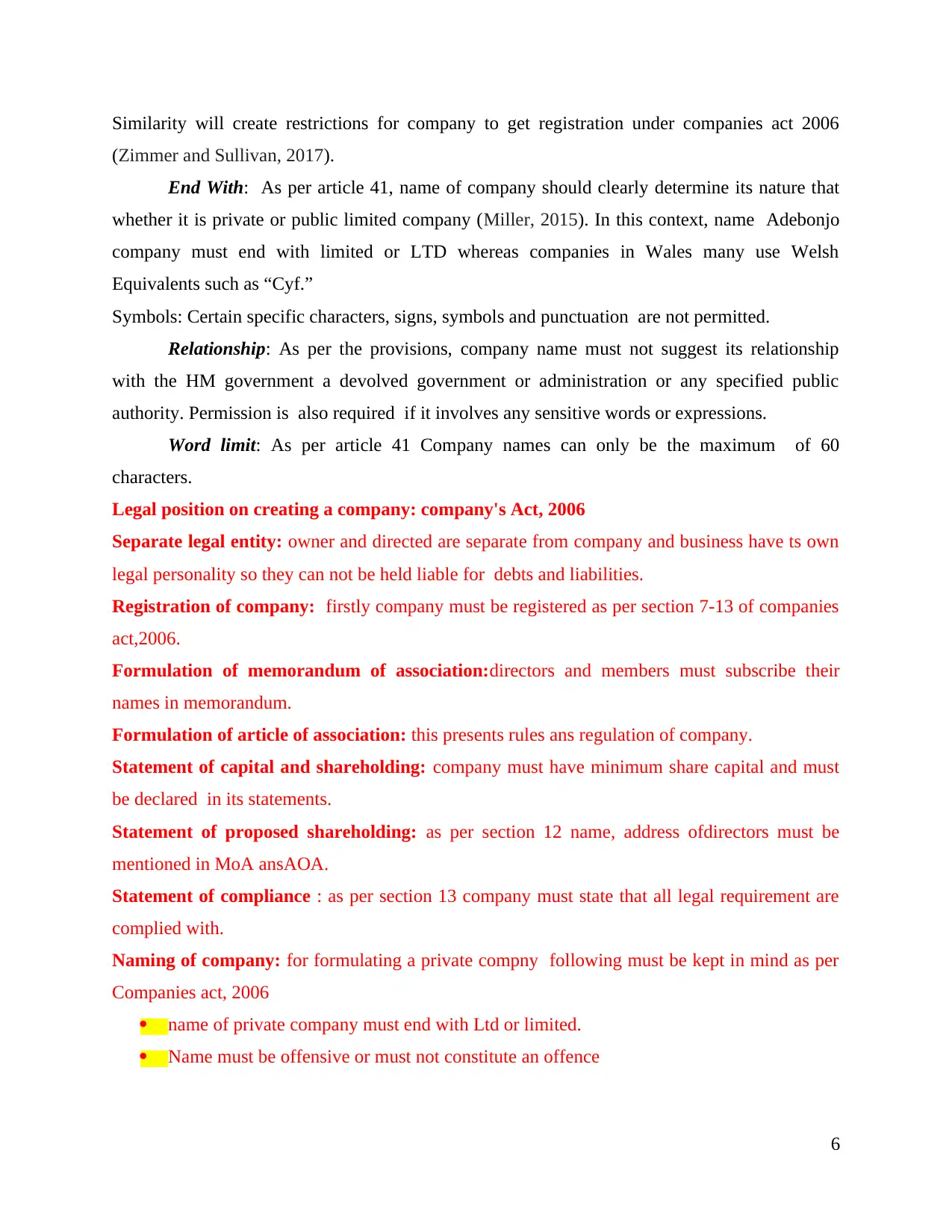
Similarity will create restrictions for company to get registration under companies act 2006
(Zimmer and Sullivan, 2017).
End With: As per article 41, name of company should clearly determine its nature that
whether it is private or public limited company (Miller, 2015). In this context, name Adebonjo
company must end with limited or LTD whereas companies in Wales many use Welsh
Equivalents such as “Cyf.”
Symbols: Certain specific characters, signs, symbols and punctuation are not permitted.
Relationship: As per the provisions, company name must not suggest its relationship
with the HM government a devolved government or administration or any specified public
authority. Permission is also required if it involves any sensitive words or expressions.
Word limit: As per article 41 Company names can only be the maximum of 60
characters.
Legal position on creating a company: company's Act, 2006
Separate legal entity: owner and directed are separate from company and business have ts own
legal personality so they can not be held liable for debts and liabilities.
Registration of company: firstly company must be registered as per section 7-13 of companies
act,2006.
Formulation of memorandum of association:directors and members must subscribe their
names in memorandum.
Formulation of article of association: this presents rules ans regulation of company.
Statement of capital and shareholding: company must have minimum share capital and must
be declared in its statements.
Statement of proposed shareholding: as per section 12 name, address ofdirectors must be
mentioned in MoA ansAOA.
Statement of compliance : as per section 13 company must state that all legal requirement are
complied with.
Naming of company: for formulating a private compny following must be kept in mind as per
Companies act, 2006
name of private company must end with Ltd or limited.
Name must be offensive or must not constitute an offence
6
(Zimmer and Sullivan, 2017).
End With: As per article 41, name of company should clearly determine its nature that
whether it is private or public limited company (Miller, 2015). In this context, name Adebonjo
company must end with limited or LTD whereas companies in Wales many use Welsh
Equivalents such as “Cyf.”
Symbols: Certain specific characters, signs, symbols and punctuation are not permitted.
Relationship: As per the provisions, company name must not suggest its relationship
with the HM government a devolved government or administration or any specified public
authority. Permission is also required if it involves any sensitive words or expressions.
Word limit: As per article 41 Company names can only be the maximum of 60
characters.
Legal position on creating a company: company's Act, 2006
Separate legal entity: owner and directed are separate from company and business have ts own
legal personality so they can not be held liable for debts and liabilities.
Registration of company: firstly company must be registered as per section 7-13 of companies
act,2006.
Formulation of memorandum of association:directors and members must subscribe their
names in memorandum.
Formulation of article of association: this presents rules ans regulation of company.
Statement of capital and shareholding: company must have minimum share capital and must
be declared in its statements.
Statement of proposed shareholding: as per section 12 name, address ofdirectors must be
mentioned in MoA ansAOA.
Statement of compliance : as per section 13 company must state that all legal requirement are
complied with.
Naming of company: for formulating a private compny following must be kept in mind as per
Companies act, 2006
name of private company must end with Ltd or limited.
Name must be offensive or must not constitute an offence
6
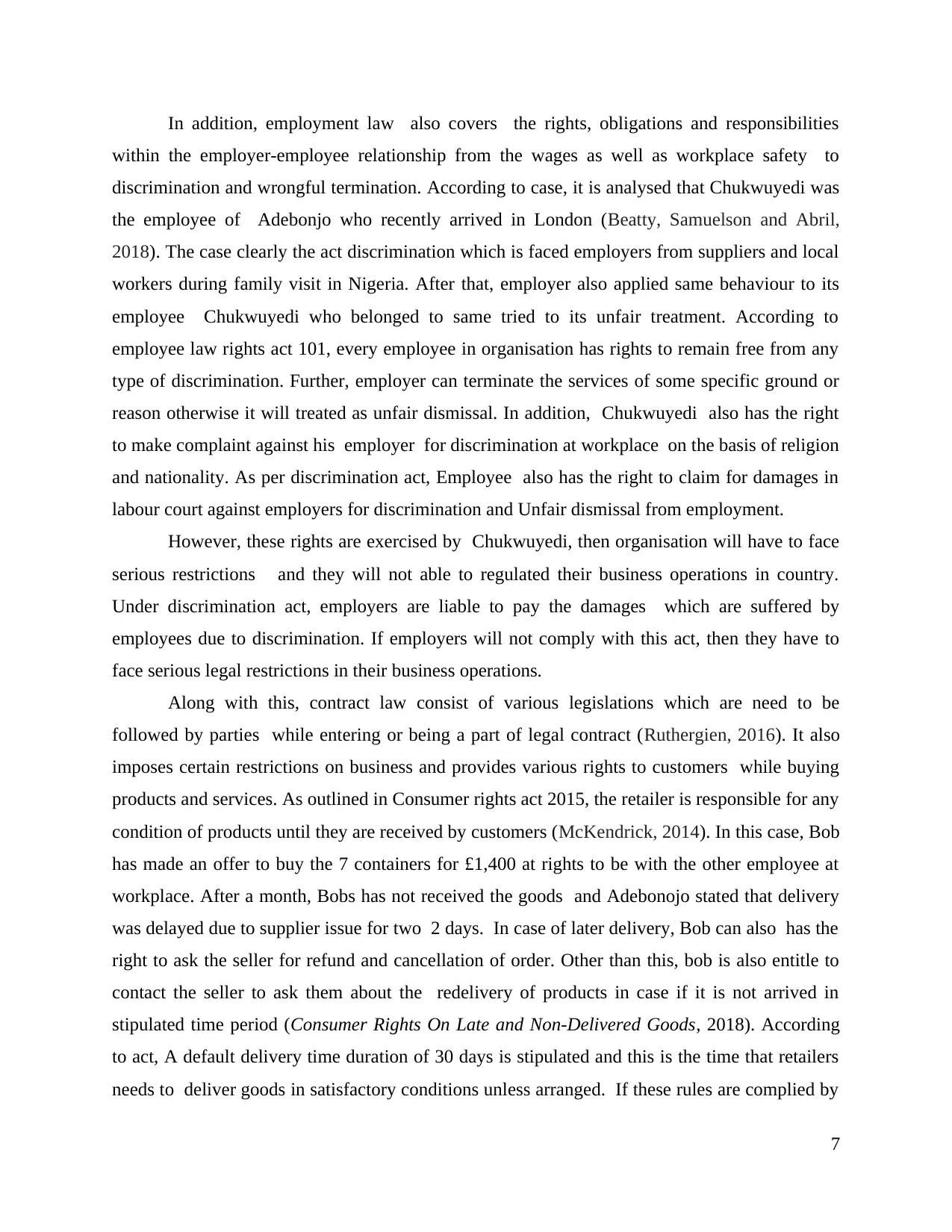
In addition, employment law also covers the rights, obligations and responsibilities
within the employer-employee relationship from the wages as well as workplace safety to
discrimination and wrongful termination. According to case, it is analysed that Chukwuyedi was
the employee of Adebonjo who recently arrived in London (Beatty, Samuelson and Abril,
2018). The case clearly the act discrimination which is faced employers from suppliers and local
workers during family visit in Nigeria. After that, employer also applied same behaviour to its
employee Chukwuyedi who belonged to same tried to its unfair treatment. According to
employee law rights act 101, every employee in organisation has rights to remain free from any
type of discrimination. Further, employer can terminate the services of some specific ground or
reason otherwise it will treated as unfair dismissal. In addition, Chukwuyedi also has the right
to make complaint against his employer for discrimination at workplace on the basis of religion
and nationality. As per discrimination act, Employee also has the right to claim for damages in
labour court against employers for discrimination and Unfair dismissal from employment.
However, these rights are exercised by Chukwuyedi, then organisation will have to face
serious restrictions and they will not able to regulated their business operations in country.
Under discrimination act, employers are liable to pay the damages which are suffered by
employees due to discrimination. If employers will not comply with this act, then they have to
face serious legal restrictions in their business operations.
Along with this, contract law consist of various legislations which are need to be
followed by parties while entering or being a part of legal contract (Ruthergien, 2016). It also
imposes certain restrictions on business and provides various rights to customers while buying
products and services. As outlined in Consumer rights act 2015, the retailer is responsible for any
condition of products until they are received by customers (McKendrick, 2014). In this case, Bob
has made an offer to buy the 7 containers for £1,400 at rights to be with the other employee at
workplace. After a month, Bobs has not received the goods and Adebonojo stated that delivery
was delayed due to supplier issue for two 2 days. In case of later delivery, Bob can also has the
right to ask the seller for refund and cancellation of order. Other than this, bob is also entitle to
contact the seller to ask them about the redelivery of products in case if it is not arrived in
stipulated time period (Consumer Rights On Late and Non-Delivered Goods, 2018). According
to act, A default delivery time duration of 30 days is stipulated and this is the time that retailers
needs to deliver goods in satisfactory conditions unless arranged. If these rules are complied by
7
within the employer-employee relationship from the wages as well as workplace safety to
discrimination and wrongful termination. According to case, it is analysed that Chukwuyedi was
the employee of Adebonjo who recently arrived in London (Beatty, Samuelson and Abril,
2018). The case clearly the act discrimination which is faced employers from suppliers and local
workers during family visit in Nigeria. After that, employer also applied same behaviour to its
employee Chukwuyedi who belonged to same tried to its unfair treatment. According to
employee law rights act 101, every employee in organisation has rights to remain free from any
type of discrimination. Further, employer can terminate the services of some specific ground or
reason otherwise it will treated as unfair dismissal. In addition, Chukwuyedi also has the right
to make complaint against his employer for discrimination at workplace on the basis of religion
and nationality. As per discrimination act, Employee also has the right to claim for damages in
labour court against employers for discrimination and Unfair dismissal from employment.
However, these rights are exercised by Chukwuyedi, then organisation will have to face
serious restrictions and they will not able to regulated their business operations in country.
Under discrimination act, employers are liable to pay the damages which are suffered by
employees due to discrimination. If employers will not comply with this act, then they have to
face serious legal restrictions in their business operations.
Along with this, contract law consist of various legislations which are need to be
followed by parties while entering or being a part of legal contract (Ruthergien, 2016). It also
imposes certain restrictions on business and provides various rights to customers while buying
products and services. As outlined in Consumer rights act 2015, the retailer is responsible for any
condition of products until they are received by customers (McKendrick, 2014). In this case, Bob
has made an offer to buy the 7 containers for £1,400 at rights to be with the other employee at
workplace. After a month, Bobs has not received the goods and Adebonojo stated that delivery
was delayed due to supplier issue for two 2 days. In case of later delivery, Bob can also has the
right to ask the seller for refund and cancellation of order. Other than this, bob is also entitle to
contact the seller to ask them about the redelivery of products in case if it is not arrived in
stipulated time period (Consumer Rights On Late and Non-Delivered Goods, 2018). According
to act, A default delivery time duration of 30 days is stipulated and this is the time that retailers
needs to deliver goods in satisfactory conditions unless arranged. If these rules are complied by
7
⊘ This is a preview!⊘
Do you want full access?
Subscribe today to unlock all pages.

Trusted by 1+ million students worldwide
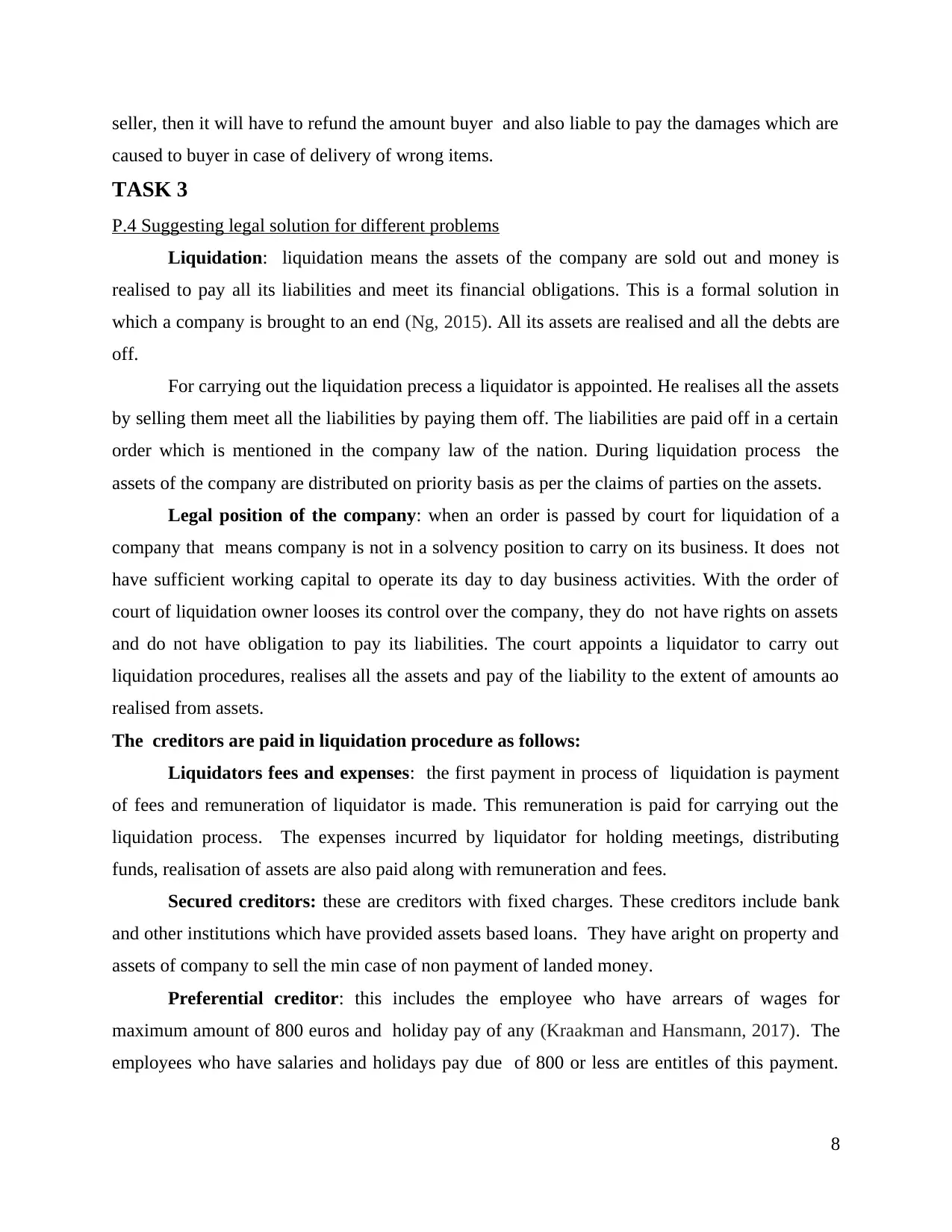
seller, then it will have to refund the amount buyer and also liable to pay the damages which are
caused to buyer in case of delivery of wrong items.
TASK 3
P.4 Suggesting legal solution for different problems
Liquidation: liquidation means the assets of the company are sold out and money is
realised to pay all its liabilities and meet its financial obligations. This is a formal solution in
which a company is brought to an end (Ng, 2015). All its assets are realised and all the debts are
off.
For carrying out the liquidation precess a liquidator is appointed. He realises all the assets
by selling them meet all the liabilities by paying them off. The liabilities are paid off in a certain
order which is mentioned in the company law of the nation. During liquidation process the
assets of the company are distributed on priority basis as per the claims of parties on the assets.
Legal position of the company: when an order is passed by court for liquidation of a
company that means company is not in a solvency position to carry on its business. It does not
have sufficient working capital to operate its day to day business activities. With the order of
court of liquidation owner looses its control over the company, they do not have rights on assets
and do not have obligation to pay its liabilities. The court appoints a liquidator to carry out
liquidation procedures, realises all the assets and pay of the liability to the extent of amounts ao
realised from assets.
The creditors are paid in liquidation procedure as follows:
Liquidators fees and expenses: the first payment in process of liquidation is payment
of fees and remuneration of liquidator is made. This remuneration is paid for carrying out the
liquidation process. The expenses incurred by liquidator for holding meetings, distributing
funds, realisation of assets are also paid along with remuneration and fees.
Secured creditors: these are creditors with fixed charges. These creditors include bank
and other institutions which have provided assets based loans. They have aright on property and
assets of company to sell the min case of non payment of landed money.
Preferential creditor: this includes the employee who have arrears of wages for
maximum amount of 800 euros and holiday pay of any (Kraakman and Hansmann, 2017). The
employees who have salaries and holidays pay due of 800 or less are entitles of this payment.
8
caused to buyer in case of delivery of wrong items.
TASK 3
P.4 Suggesting legal solution for different problems
Liquidation: liquidation means the assets of the company are sold out and money is
realised to pay all its liabilities and meet its financial obligations. This is a formal solution in
which a company is brought to an end (Ng, 2015). All its assets are realised and all the debts are
off.
For carrying out the liquidation precess a liquidator is appointed. He realises all the assets
by selling them meet all the liabilities by paying them off. The liabilities are paid off in a certain
order which is mentioned in the company law of the nation. During liquidation process the
assets of the company are distributed on priority basis as per the claims of parties on the assets.
Legal position of the company: when an order is passed by court for liquidation of a
company that means company is not in a solvency position to carry on its business. It does not
have sufficient working capital to operate its day to day business activities. With the order of
court of liquidation owner looses its control over the company, they do not have rights on assets
and do not have obligation to pay its liabilities. The court appoints a liquidator to carry out
liquidation procedures, realises all the assets and pay of the liability to the extent of amounts ao
realised from assets.
The creditors are paid in liquidation procedure as follows:
Liquidators fees and expenses: the first payment in process of liquidation is payment
of fees and remuneration of liquidator is made. This remuneration is paid for carrying out the
liquidation process. The expenses incurred by liquidator for holding meetings, distributing
funds, realisation of assets are also paid along with remuneration and fees.
Secured creditors: these are creditors with fixed charges. These creditors include bank
and other institutions which have provided assets based loans. They have aright on property and
assets of company to sell the min case of non payment of landed money.
Preferential creditor: this includes the employee who have arrears of wages for
maximum amount of 800 euros and holiday pay of any (Kraakman and Hansmann, 2017). The
employees who have salaries and holidays pay due of 800 or less are entitles of this payment.
8
Paraphrase This Document
Need a fresh take? Get an instant paraphrase of this document with our AI Paraphraser
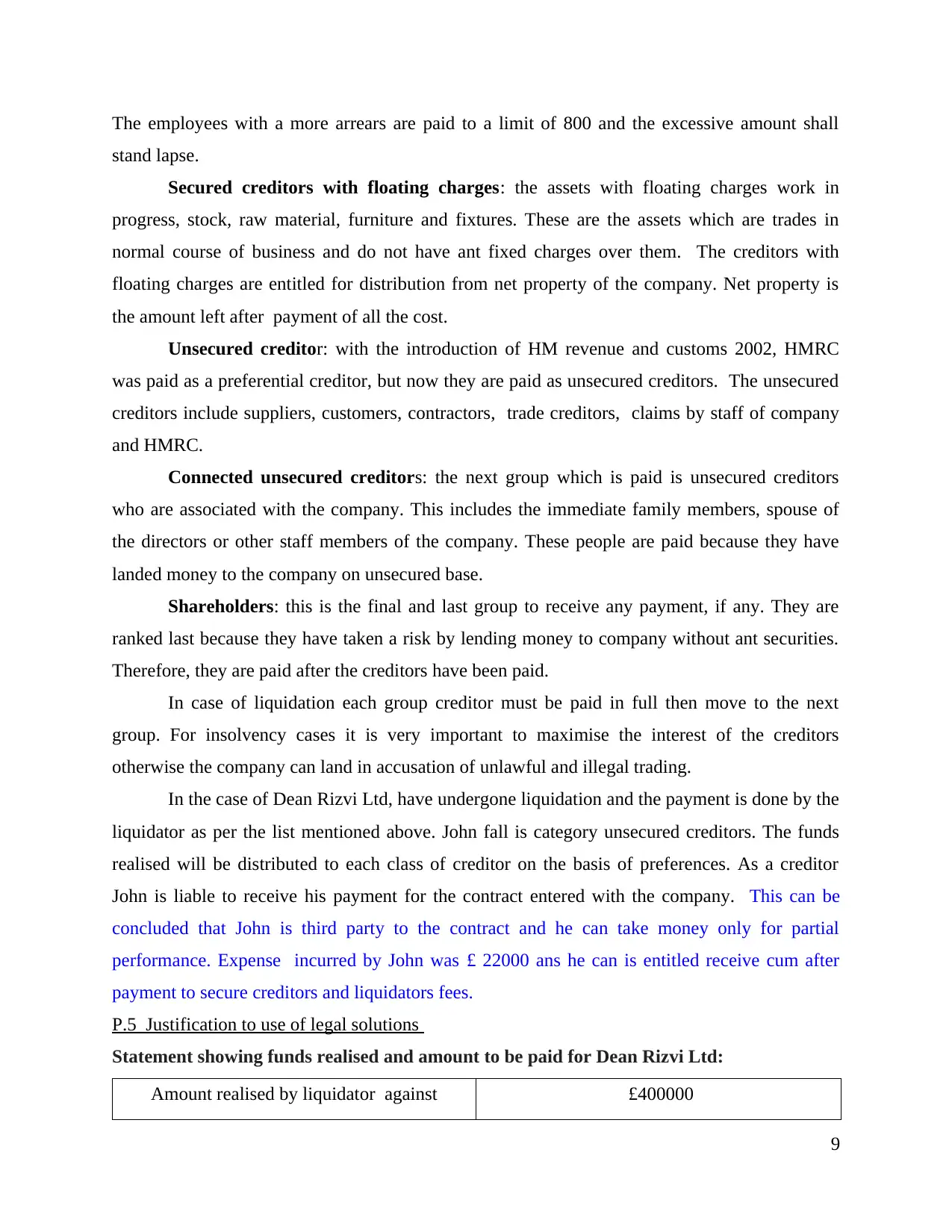
The employees with a more arrears are paid to a limit of 800 and the excessive amount shall
stand lapse.
Secured creditors with floating charges: the assets with floating charges work in
progress, stock, raw material, furniture and fixtures. These are the assets which are trades in
normal course of business and do not have ant fixed charges over them. The creditors with
floating charges are entitled for distribution from net property of the company. Net property is
the amount left after payment of all the cost.
Unsecured creditor: with the introduction of HM revenue and customs 2002, HMRC
was paid as a preferential creditor, but now they are paid as unsecured creditors. The unsecured
creditors include suppliers, customers, contractors, trade creditors, claims by staff of company
and HMRC.
Connected unsecured creditors: the next group which is paid is unsecured creditors
who are associated with the company. This includes the immediate family members, spouse of
the directors or other staff members of the company. These people are paid because they have
landed money to the company on unsecured base.
Shareholders: this is the final and last group to receive any payment, if any. They are
ranked last because they have taken a risk by lending money to company without ant securities.
Therefore, they are paid after the creditors have been paid.
In case of liquidation each group creditor must be paid in full then move to the next
group. For insolvency cases it is very important to maximise the interest of the creditors
otherwise the company can land in accusation of unlawful and illegal trading.
In the case of Dean Rizvi Ltd, have undergone liquidation and the payment is done by the
liquidator as per the list mentioned above. John fall is category unsecured creditors. The funds
realised will be distributed to each class of creditor on the basis of preferences. As a creditor
John is liable to receive his payment for the contract entered with the company. This can be
concluded that John is third party to the contract and he can take money only for partial
performance. Expense incurred by John was £ 22000 ans he can is entitled receive cum after
payment to secure creditors and liquidators fees.
P.5 Justification to use of legal solutions
Statement showing funds realised and amount to be paid for Dean Rizvi Ltd:
Amount realised by liquidator against £400000
9
stand lapse.
Secured creditors with floating charges: the assets with floating charges work in
progress, stock, raw material, furniture and fixtures. These are the assets which are trades in
normal course of business and do not have ant fixed charges over them. The creditors with
floating charges are entitled for distribution from net property of the company. Net property is
the amount left after payment of all the cost.
Unsecured creditor: with the introduction of HM revenue and customs 2002, HMRC
was paid as a preferential creditor, but now they are paid as unsecured creditors. The unsecured
creditors include suppliers, customers, contractors, trade creditors, claims by staff of company
and HMRC.
Connected unsecured creditors: the next group which is paid is unsecured creditors
who are associated with the company. This includes the immediate family members, spouse of
the directors or other staff members of the company. These people are paid because they have
landed money to the company on unsecured base.
Shareholders: this is the final and last group to receive any payment, if any. They are
ranked last because they have taken a risk by lending money to company without ant securities.
Therefore, they are paid after the creditors have been paid.
In case of liquidation each group creditor must be paid in full then move to the next
group. For insolvency cases it is very important to maximise the interest of the creditors
otherwise the company can land in accusation of unlawful and illegal trading.
In the case of Dean Rizvi Ltd, have undergone liquidation and the payment is done by the
liquidator as per the list mentioned above. John fall is category unsecured creditors. The funds
realised will be distributed to each class of creditor on the basis of preferences. As a creditor
John is liable to receive his payment for the contract entered with the company. This can be
concluded that John is third party to the contract and he can take money only for partial
performance. Expense incurred by John was £ 22000 ans he can is entitled receive cum after
payment to secure creditors and liquidators fees.
P.5 Justification to use of legal solutions
Statement showing funds realised and amount to be paid for Dean Rizvi Ltd:
Amount realised by liquidator against £400000
9
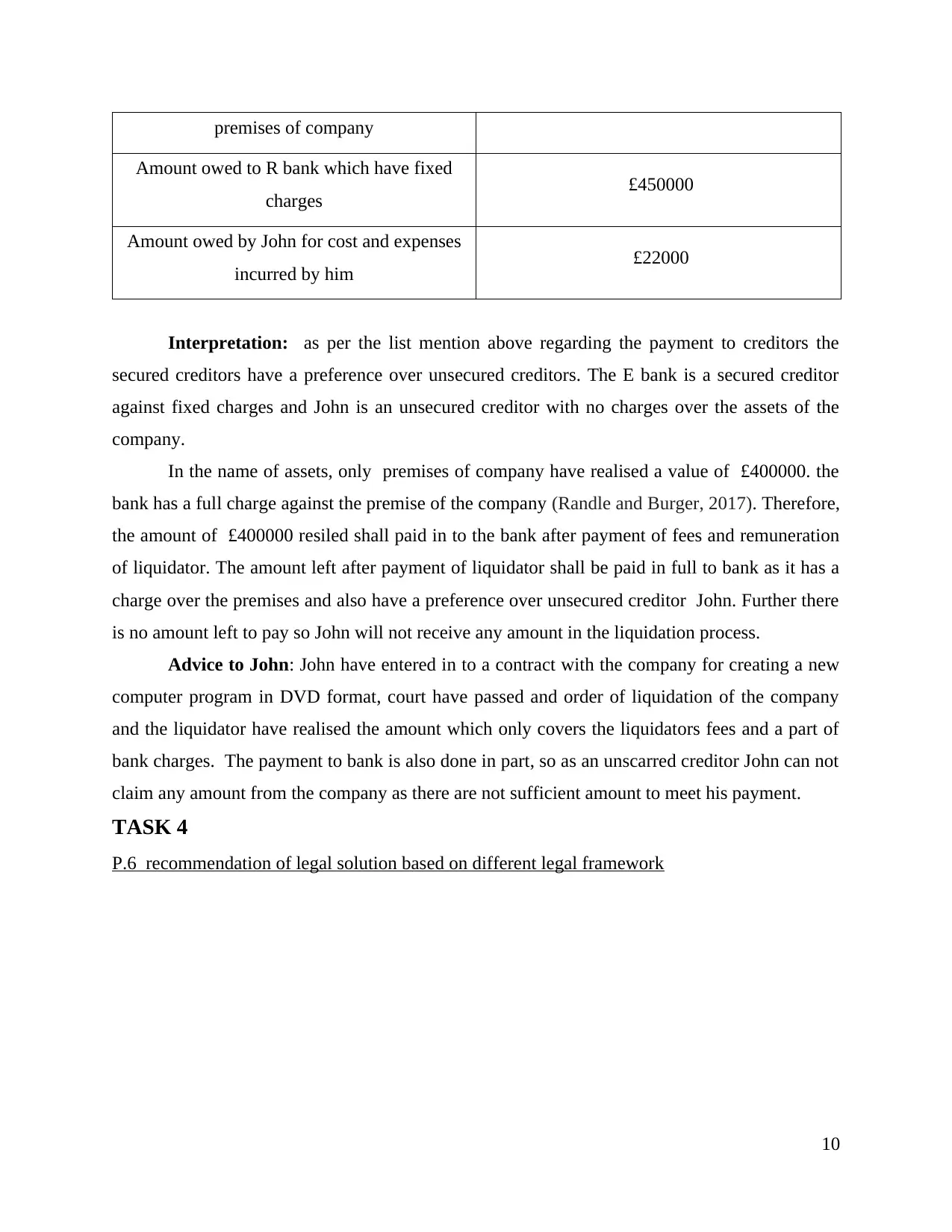
premises of company
Amount owed to R bank which have fixed
charges £450000
Amount owed by John for cost and expenses
incurred by him £22000
Interpretation: as per the list mention above regarding the payment to creditors the
secured creditors have a preference over unsecured creditors. The E bank is a secured creditor
against fixed charges and John is an unsecured creditor with no charges over the assets of the
company.
In the name of assets, only premises of company have realised a value of £400000. the
bank has a full charge against the premise of the company (Randle and Burger, 2017). Therefore,
the amount of £400000 resiled shall paid in to the bank after payment of fees and remuneration
of liquidator. The amount left after payment of liquidator shall be paid in full to bank as it has a
charge over the premises and also have a preference over unsecured creditor John. Further there
is no amount left to pay so John will not receive any amount in the liquidation process.
Advice to John: John have entered in to a contract with the company for creating a new
computer program in DVD format, court have passed and order of liquidation of the company
and the liquidator have realised the amount which only covers the liquidators fees and a part of
bank charges. The payment to bank is also done in part, so as an unscarred creditor John can not
claim any amount from the company as there are not sufficient amount to meet his payment.
TASK 4
P.6 recommendation of legal solution based on different legal framework
10
Amount owed to R bank which have fixed
charges £450000
Amount owed by John for cost and expenses
incurred by him £22000
Interpretation: as per the list mention above regarding the payment to creditors the
secured creditors have a preference over unsecured creditors. The E bank is a secured creditor
against fixed charges and John is an unsecured creditor with no charges over the assets of the
company.
In the name of assets, only premises of company have realised a value of £400000. the
bank has a full charge against the premise of the company (Randle and Burger, 2017). Therefore,
the amount of £400000 resiled shall paid in to the bank after payment of fees and remuneration
of liquidator. The amount left after payment of liquidator shall be paid in full to bank as it has a
charge over the premises and also have a preference over unsecured creditor John. Further there
is no amount left to pay so John will not receive any amount in the liquidation process.
Advice to John: John have entered in to a contract with the company for creating a new
computer program in DVD format, court have passed and order of liquidation of the company
and the liquidator have realised the amount which only covers the liquidators fees and a part of
bank charges. The payment to bank is also done in part, so as an unscarred creditor John can not
claim any amount from the company as there are not sufficient amount to meet his payment.
TASK 4
P.6 recommendation of legal solution based on different legal framework
10
⊘ This is a preview!⊘
Do you want full access?
Subscribe today to unlock all pages.

Trusted by 1+ million students worldwide
1 out of 18
Related Documents
Your All-in-One AI-Powered Toolkit for Academic Success.
+13062052269
info@desklib.com
Available 24*7 on WhatsApp / Email
![[object Object]](/_next/static/media/star-bottom.7253800d.svg)
Unlock your academic potential
Copyright © 2020–2026 A2Z Services. All Rights Reserved. Developed and managed by ZUCOL.





